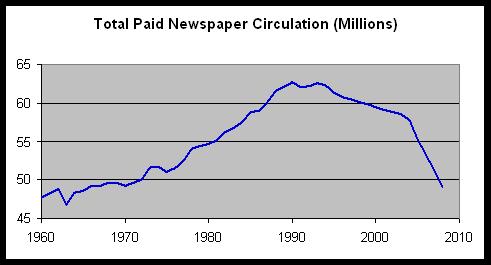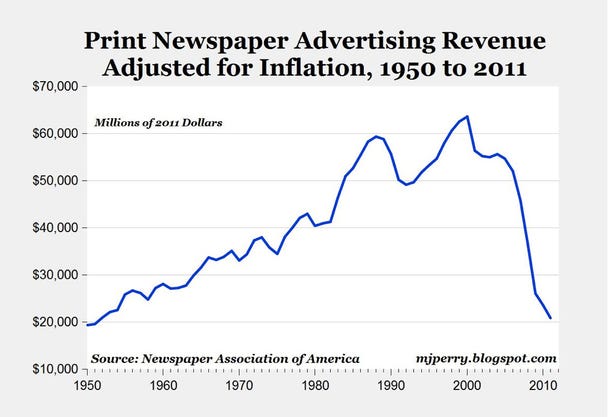I've decided that newspapers are simply not content to die peacefully; they are now beginning to commit suicide.
I grew up with the New York Times, so I understand what quality journalism means. I have also lived for extended periods in Los Angeles and Washington, DC, as well as major cities in other countries. I have always loved the experience of reading a great newspaper over my morning coffee.
When I moved here over 20 years ago, I was confronted with a sad spectacle. There were two local papers, one morning and one afternoon. The afternoon paper died some years ago, so no comment necessary, but the morning paper (always much the larger circulation) started out below average IMHO and got steadily worse. Decent local news, but poor coverage of everything else.
As circulation gradually ebbed (like everywhere else), the paper continuously cut costs until today it's a mere shadow of its former self (which wasn't much to start with).
Even so, we continued to get daily delivery, which currently costs us $192 a year.
Today we got a letter from the publisher that in two more weeks the cost will jump to $270 a year. That's a 40% increase! Now I admit that the subscription price has crept up while our subscription cost has been grandfathered at a lower level, but still that amounts to a 32% increase over the current rate.
For the first time, I understand all the comments I've seen here from people dropping their print subscriptions. It's just amazing that the newspaper management can't change their paradigm.
I grew up with the New York Times, so I understand what quality journalism means. I have also lived for extended periods in Los Angeles and Washington, DC, as well as major cities in other countries. I have always loved the experience of reading a great newspaper over my morning coffee.
When I moved here over 20 years ago, I was confronted with a sad spectacle. There were two local papers, one morning and one afternoon. The afternoon paper died some years ago, so no comment necessary, but the morning paper (always much the larger circulation) started out below average IMHO and got steadily worse. Decent local news, but poor coverage of everything else.
As circulation gradually ebbed (like everywhere else), the paper continuously cut costs until today it's a mere shadow of its former self (which wasn't much to start with).
Even so, we continued to get daily delivery, which currently costs us $192 a year.
Today we got a letter from the publisher that in two more weeks the cost will jump to $270 a year. That's a 40% increase! Now I admit that the subscription price has crept up while our subscription cost has been grandfathered at a lower level, but still that amounts to a 32% increase over the current rate.
For the first time, I understand all the comments I've seen here from people dropping their print subscriptions. It's just amazing that the newspaper management can't change their paradigm.


